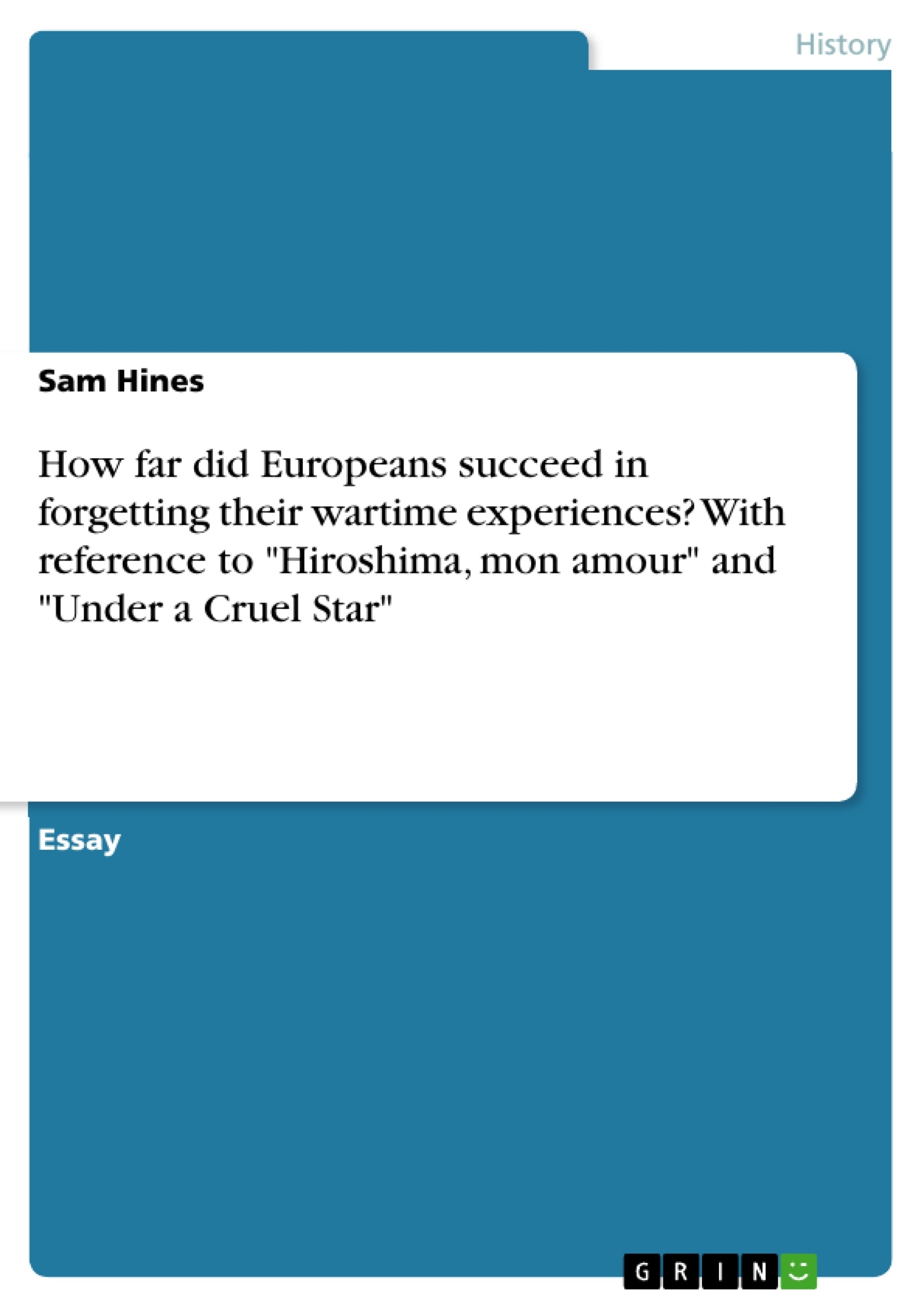This essay will seek to demonstrate that whether or not these experiences were forgotten hugely depended on the person and whether they actually wanted to wipe their past from existence: some simply could not forget, others refused to forget, and a number attempted to block out their memories in the pursuance of normality. Simultaneously, the use of national propaganda to reshape the ‘truth’ complicates the issue, adding an element of ‘institutional memory’ into people’s wartime recollections. Due to this, ‘memory’ will be regarded as what people think they remember rather than what they actually experienced.
The memories of the Second World War continue to produce a multitude of histories, films and biographies and this essay will focus on evidence from two key texts, namely the screenplay "Hiroshima, mon amour" by Marguerite Duras detailing the love affair of a man from Hiroshima and a woman from Nevers and the memoir "Under a Cruel Star" by Heda Margolius Kovály describing her suffering in Prague, to investigate the European success of forgetting the war before concluding that, for most survivors, the main problem was not the ability to remember but rather the inability to forget, especially in countries that were previously occupied by the Nazi regime. Divisions between neighbours, the continuance of Nazi anti-Semitic doctrines and the constant reminders of the destruction wrought by war made the events unforgettable and, thus, remembrance triumphed: the majority of Europeans were unsuccessful in forgetting their wartime experiences.
Europeans, both Eastern and Western, encountered a plethora of different experiences during the war, some positive but many negative due to the brutality of Nazism and the Red Army. Hardly a single family living on war-torn land was left untouched by their violence, losing family members, homes and, in some cases, their minds.
Inhaltsverzeichnis (Table of Contents)
- Introduction
- The Unforgettable War
- Reminders of Death and Destruction
- The Trauma of Occupation
- The Interconnection of Past and Present
- The Persistence of Anti-Semitism
- The Need to Remember
Zielsetzung und Themenschwerpunkte (Objectives and Key Themes)
This essay aims to investigate the extent to which Europeans succeeded in forgetting their wartime experiences. It examines the enduring nature of memories through the lens of individual narratives and the influence of national propaganda.
- The impact of traumatic experiences on individual memory
- The role of national propaganda in shaping collective memory
- The persistence of wartime trauma in the post-war period
- The interconnectedness of personal and collective memory
- The importance of remembering wartime atrocities for future generations
Zusammenfassung der Kapitel (Chapter Summaries)
- Introduction: This section establishes the essay's central question regarding the forgetting of wartime experiences. It highlights the prevalence of wartime trauma and introduces the concept of "memory" as a subjective interpretation.
- The Unforgettable War: This chapter explores various factors that contributed to the enduring nature of wartime memories. It examines the pervasiveness of death and destruction, the impact of occupation and collaboration, and the intertwining of past and present experiences.
- Reminders of Death and Destruction: This section discusses the widespread impact of war casualties and the physical devastation of European landscapes, arguing that these factors made forgetting the war nearly impossible.
- The Trauma of Occupation: This section examines the complex social and political divisions created by wartime occupation, highlighting the enduring trauma experienced by collaborators and resistance fighters.
- The Interconnection of Past and Present: This section analyzes the blurring of past and present experiences, suggesting that wartime trauma continued to define individuals even in the post-war era.
- The Persistence of Anti-Semitism: This section focuses on the enduring nature of anti-Semitism in Eastern Europe, arguing that it continued even after the war, making it impossible for Jewish survivors to forget their wartime suffering.
- The Need to Remember: This chapter explores the idea that remembering wartime atrocities is crucial for learning from the past and preventing future tragedies. It highlights the importance of preserving memory for future generations.
Schlüsselwörter (Keywords)
This essay explores the themes of memory, trauma, forgetting, wartime experiences, national propaganda, collective memory, individual memory, anti-Semitism, and the legacy of the Second World War in Europe.
Frequently Asked Questions
Did Europeans successfully forget their WWII experiences?
The essay concludes that most survivors were unsuccessful in forgetting, as the trauma of occupation and constant reminders of destruction made the events unforgettable.
Which texts are used to analyze wartime memory?
The analysis is based on Marguerite Duras's "Hiroshima, mon amour" and Heda Margolius Kovály's memoir "Under a Cruel Star".
How did national propaganda influence memory?
National propaganda often reshaped the ‘truth’ to create an ‘institutional memory’ that sometimes conflicted with personal experiences.
What role did anti-Semitism play in post-war memory?
The persistence of anti-Semitic doctrines, especially in Eastern Europe, made it impossible for many Jewish survivors to move past their wartime suffering.
What is the difference between "experienced" and "remembered" memory in this essay?
Memory is regarded as what people think they remember (subjective interpretation) rather than an objective record of what they actually experienced.
- Quote paper
- Sam Hines (Author), 2019, How far did Europeans succeed in forgetting their wartime experiences? With reference to "Hiroshima, mon amour" and "Under a Cruel Star", Munich, GRIN Verlag, https://www.grin.com/document/980119



